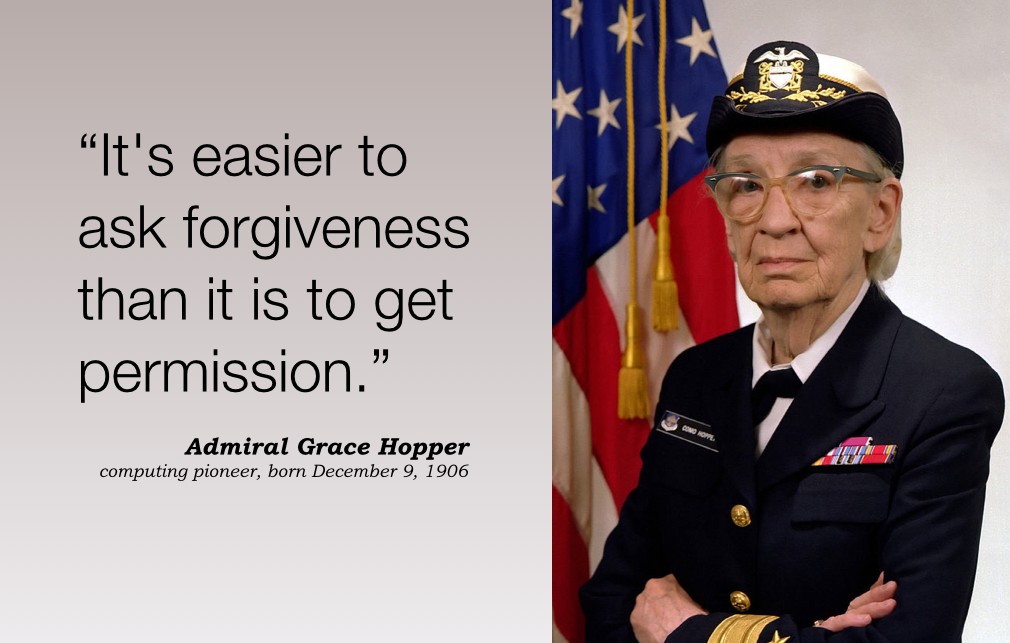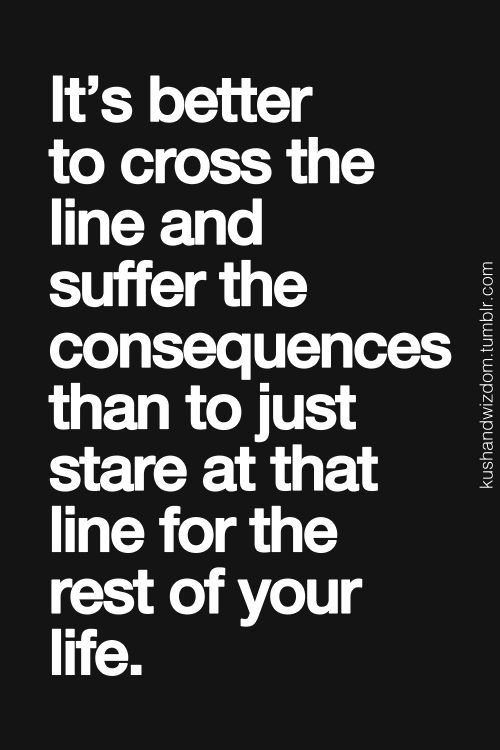Gentlemen: Beg for Forgiveness or Ask for Permission?

Forgiveness or Permission?
I recently had a conversation with a client of mine regarding what he truly wants. He had so many things to say about what he wanted. And, he had even more to say about why it’s too hard or impossible to make happen. There are all these “reasons” for how it just can’t be done, or it’s too scary, or what will happen if it doesn’t work out – and every last one of them is made up.
In too many cases, we are seeking permission to take the leap and go for it. We’re looking for the validation that our decisions are good ones, and we should pursue them. For this client, he needed someone he respected to tell him that what he truly wanted was worthy and give him permission to go out and get it.
But more importantly, he needed someone to get him to cross a line. He needed a push to be bold and decide.
We’re all dealing with a myriad of lines we’re afraid to cross. Taking the big leap of faith to start your new business venture, or having the courage to make that pretty girl your wife, or investing in yourself after years of investing in everyone else – these are lines we’ve drawn and need help, encouragement, and a good push to cross.
In today’s episode, we’ll explore the power and pitfalls of crossing lines. We’re also going to jump into the debate of whether it’s better to beg for forgiveness or ask for permission. In some cases, one is a slippery slope to disaster. In others, it is the only way to go.
Take a listen and let me know what you think in the comments below. [Subscribe Here]
SHOW NOTES:
One of our favorite quotes, and I say our favorite because we all love using, sharing, and considering it in our lives, is this:

Admiral Grace Hopper was an all around bad ass. She was born and raised before WWI and completed her undergrad and Masters in mathematics and physics before WWII, but tried to enlist in the Navy and was rejected for being too old (at 34). She joined the reserves instead, graduated top of her class, and began working on computing languages for the Navy that way.
She felt there was a safer, smarter way to calculate and store data, and was convinced that a programming language could be designed using English, rather than mathematical symbols. After her successes in data manipulation and computer programming for the reserves, she continued to pursue a career in the Navy, even declining a professorship at Vassar University in favor of a Navy contract.
She pushed against the grain with her compiler (a system that converts mathematical formulas and data into machine code), and took it beyond mathematics by introducing English words into the system so it could be adopted and expanded by people and processors.
Working in the military her entire life, she learned very quickly that large systems of people and processes are averse to change. She became the oldest active duty officer at the time, developed a data compiler that nobody that was possible, and then moved it into English recognition, creating COBOL – a programming language we still use today.
And she did it with the understanding that humans don’t like change, and that it’s often easier to ask forgiveness than to get permission. She knew what she had, and she knew it was worth the risk. She also knew permission would come too slowly and with too many caveats and compromises. Grace Hopper knew she had to cross lines and break a few rules because her mission was bigger than the permission she was granted.
And although it sounds like she’s just a big trouble-making nerd, she was honored and heavily awarded for her efforts. She was pulled out of retirement twice at 60 and 65 years old and promoted to Commodore. She even remained on active duty several years past mandatory retirement by a special act of congress. She was awarded Department of Defense medals, the Presidential Medal of Freedom, and finally retired as Rear Admiral (Commodore rank converted) in 1986. AT EIGHTY YEARS OLD.
Admiral Hopper (1906-1992) was hardcore because she knew what she wanted and knew it couldn’t be ignored. She knew the lines that needed to be crossed, at least vaguely, and embraced the uncertainty because what she was suggesting had never been done before.
When you consider what lines you need to cross, what areas you need to ask forgiveness rather than permission, you probably have examples of other people doing what you want, right? You have a frame of reference. Hopper did not, and that’s what makes her such a stellar example.
In business, crossing the line can be the best thing since sliced bread. It can also be the death of you, your business, and your ideals. So the big question is, when do you beg forgiveness, and when do you ask permission?
Beg for Forgiveness
There are several areas where begging forgiveness is a better idea than asking permission. Most of the time it’s when something minor is being held up in a bureaucratic bottleneck, or when something absolutely needs to get done without delay.
When I lived in Chicagoland, I lived in a nice duplex in the suburbs. It had pretty uniform landscaping, bushes, etc., and there was a giant shrub that flanked the front door. It was an eyesore because it was growing larger every year, and it was encroaching on the screen door space.
We asked if the association could cut it down or trim it back aggressively, and receive nothing but excuses and ho-hum answers. This, my friends, does not play well with Blake. So I went out and bought a chainsaw. I came home, chopped it down, chopped it up, pulled the roots out, and planted a perfect little rose tree in it’s place.
I had already decided the worst thing the association would do was sent us an angry letter, and possibly a fine. I was also prepared to fight that too. I just wasn’t going to accept “too bad” as the answer to poor landscaping, so I crossed the line, took care of it myself, and prepared to beg for forgiveness.
Another area where forgiveness trumps permission is to break a pattern. This is often recognized by the phrase, “you just have to rip off the band aid and deal.”
When something needs to be done and you’re stuck in a holding pattern, it can be stifling. You cannot control things you refuse to confront, right? So, you decide to confront it and take action one day. It may get you in trouble. It may cause the people around you to get pretty upset with you.
Provided it isn’t detrimental or damaging to anyone’s real health, however, you’ll be forgiven. Telling someone his or her significant other is cheating is a terrible and tough thing to do, but it’s something that needs to be done from time to time. It may not be “your place” to tell them this information, but when you feel it in your core that it needs to be done, you do it. And you’ll be forgiven for it. Eventually.
Anytime you know something is bigger than the bottlenecks and bureaucrats in charge, and doing so will not hurt anyone physically, that’s when it’s usually better to go for it and beg for forgiveness later. There are exceptions, of course, but as a general rule, this applies pretty accurately.
Ask for Permission
Asking for permission is not a sign of weakness. I just want to put that out there because the tone of this episode can feel like it’s all “shoot first, ask questions later” and that’s not always the case. I will get pretty fired up and motivational in my delivery of the “go for it” message, but I can also (as you’ll now discover) get just as impassioned with asking first.
Where is permission most important? Where is it most valued, most understood, appreciated, and respected? In your relationships, that’s where.
In any relationship you enter into, whether it’s for an evening or a lifetime, you will get the most value in return when you proceed with permission. In one of my favorite episodes, I take flip side of the “shoot first, ask questions later” argument by showing you why being a hero makes you an idiot.
When you are dating, you need permission to get physically intimate. This shouldn’t even need mentioning, but no means no. I mean, really. I can’t even begin to tell you how many of my friends have been assaulted because permission was not given, but liberties were taken. Let’s collectively stop this from happening. Gentlemen don’t do that. Pricks do.
In business relationships, permission can be more important because other positions hang in the balance. If you feel like sending a mass email to all your customers telling them about a new return policy, that might cost the company a lot of money, and cause layoffs and cuts because of it. Permission is important there.
Permission is important anytime there’s money involved. “Can I borrow ten bucks” is much better than, “hey, I took ten bucks from your wallet earlier. I’ll pay you back later.”
And finally, in this day and age privacy online is important. There’s a pretty big overlap of sharing without permission, removing it, and asking for forgiveness. In times where personal information feels like it’s going to be shared without permission, just ask the person if it’s okay to share it. It’s pretty simple, right?
Blending Permission with Action
 The concept I invite you to chew on is taking action by asking permission. I know it may sound a little weak, but stick with me for a moment. What kinds of things do you want permission to do, to have, to feel, to experience? Whose permission do you need? Could you even ask? Why not?
The concept I invite you to chew on is taking action by asking permission. I know it may sound a little weak, but stick with me for a moment. What kinds of things do you want permission to do, to have, to feel, to experience? Whose permission do you need? Could you even ask? Why not?
Do you need guts to ask permission? Of course you do. Think about all the times you’ve had to ask someone out on a date. Think about bidding on jobs, projects, contracts – anytime you need someone else’s approval to get hired. You’re asking them to hire you, right? Think about the big ask – will you marry me? Do I have permission to be your one and only forever? Huge deal.
So I invite you to get clear on what you want more of and less of in your life, from today on. What kinds of things need permission and which can be done now to seek forgiveness later? If we go a little deeper, which things require permission from YOU to take action? You don’t need anyone’s permission to go out and get a better job, lover, or life – you need to give yourself permission to do that.
So take some time to answer the clarity questions and find the lines you want to cross (with permission) and those you need to cross (with forgiveness). With clarity, you gain confidence. With confidence, you can do almost anything.
Consider this a little push. The best time to plant a tree is 20 years ago. The next best time is right now. You will regret every chance you didn’t take when your life comes to a close. It’s better to cross the line and manage the consequences than to stare at the line for the rest of your life.
What actions have you taken were better because you felt it was better
to ask forgiveness than to seek permission? Did it work out in your favor?
Are there any areas you think I missed? Where do YOU draw the line, personally?
Leave a comment below so we can connect!





